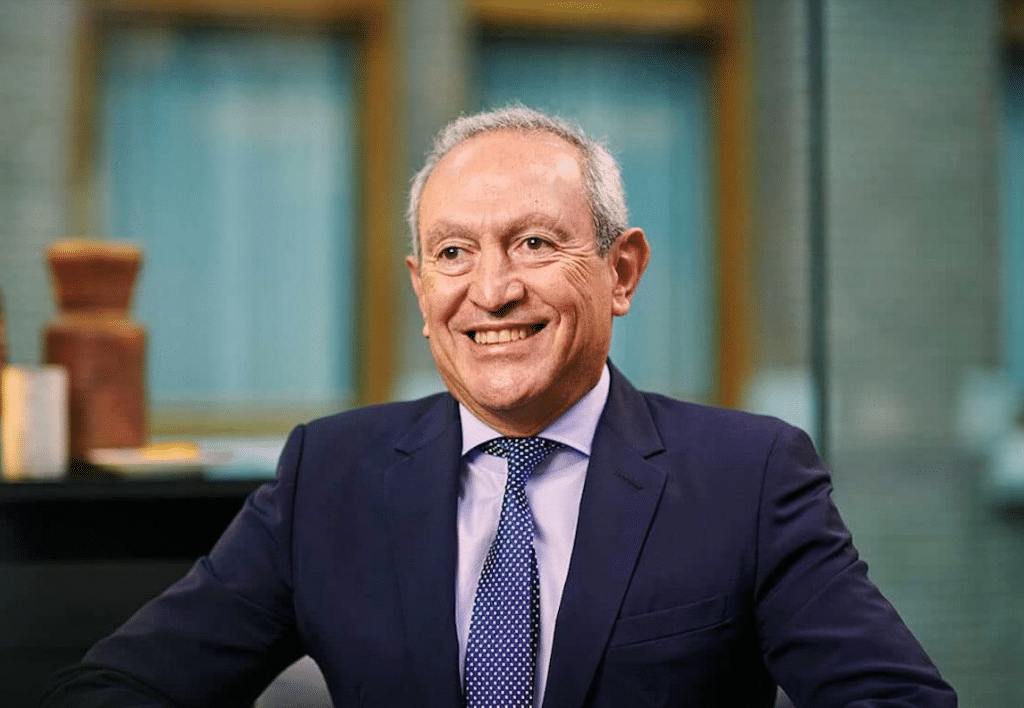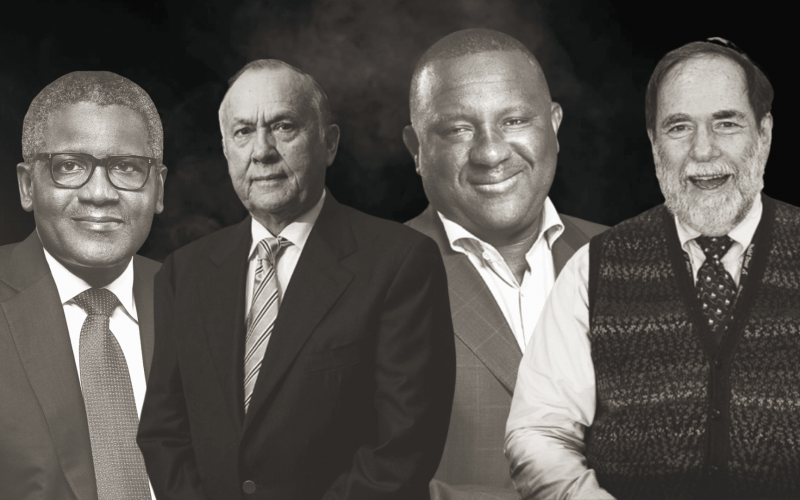We frequently hear about wealth in broad strokes—figures in the billions, as well as the industries from which these fortunes originate. But what exactly does it mean to be one of Africa’s richest men? How do these individuals influence the businesses and lives of millions throughout the continent? In this article, I’ll take you through the story behind the top richest men in Africa.
I was hooked from the moment I read about Aliko Dangote’s journey from a small trade operation to becoming Africa’s richest man. Not just by the numbers, but also by the determination, strategy, and effect these individuals have in their home nations and beyond. This article is more than just a list of the richest men; it is also about understanding their journeys, the sectors they dominate, and the legacies they are leaving behind.
10 Richest Men in Africa and Their Net Worth
Here’s a list of the ten richest men in Africa, as per the most recent data:
- Aliko Dangote (Nigeria)
- Net Worth: $15.2 billion
- Industry: Manufacturing (Cement, Sugar, Flour)
- Johann Rupert & Family (South Africa)
- Net Worth: Around $11 billion
- Industry: Luxury Goods (Richemont)
- Nicky Oppenheimer & Family (South Africa)
- Net Worth: $8 billion
- Industry: Mining (Diamonds)
- Nassef Sawiris (Egypt)
- Net worth: $7.5 billion
- Industry: Construction and chemical industries (OCI).
- Mike Adenuga (Nigeria)
- Net worth: $6.1 billion
- Industry: Telecommunications (Globacom) and oil.
- Abdulsamad Rabiu (Nigeria)
- Net Worth: $5.5 billion
- Industry: Manufacturing and Infrastructure (BUA Group)
- Issad Rebrab & Family (Algeria) –
- Net worth: $4.8 billion –
- Industry: Food (Cevital)
- Naguib Sawiris (Egypt)
- Net worth: $3.3 billion
- Industry: Telecommunications and media industry.
- Patrice Motsepe (South Africa)
- Net worth: $3 billion
- Industry: Mining (African Rainbow Minerals).
- Mohammed Dewji (Tanzania)
- Net Worth: $1.6 billion
- Industry: Manufacturing and Textiles (METL Group)
These rankings are based on the most recent available data and reflect these persons’ wealth, which may fluctuate owing to market conditions and other causes.
#1. Aliko Dangote (Nigeria)

Net worth: $15 billion
Industry: Manufacturing (cement, sugar, flour)
Aliko Dangote is a household name in Africa, not only because he is the continent’s richest man, but also because his conglomerate, the Dangote Group, has a tremendous impact on the Nigerian economy. What many people do not recognize is that Dangote intentionally moved his business from commodity trading to manufacturing, lessening Nigeria’s reliance on imports. His cement mills are a prime example of how to attain size and market dominance. But, beyond the numbers, Dangote’s goal for industrializing Africa reveals much about his long-term thinking. His investments in agriculture and oil refining have the potential to substantially reshape Nigeria’s economic environment.
#2. Johann Rupert & Family (South Africa)

Net Worth: Around $11 billion
Industry: Luxury Goods (Richemont)
Johann Rupert has quietly developed an empire in the luxury goods sector. Rupert has strengthened his position as chairman of Richemont, the business that owns names such as Cartier and Montblanc in Africa and globally. However, what is frequently missed is his smart decision to enter the Chinese market early on, which considerably accelerated Richemont’s expansion. Rupert’s tale is also one of altruism; he has been active in various conservation activities in South Africa, demonstrating a commitment to preserve the continent’s natural heritage.
#3. Nicky Oppenheimer & Family (South Africa)

Net Worth: Around $8 billion
Industry: Mining (Diamonds)
The Oppenheimer name is linked with diamonds due to their ownership of De Beers, the world’s largest diamond manufacturer. However, Nicky Oppenheimer’s decision to sell the family’s stake in De Beers to Anglo American for $5.1 billion in 2012 represented a watershed moment. Many people are unaware that Oppenheimer has recently shifted his focus to investing in conservation and agricultural projects throughout Africa. His Tswalu Kalahari Reserve is one of the continent’s most ambitious private conservation projects, demonstrating his commitment to giving back.
#4. Nassef Sawiris (Egypt)

Net worth: $7.5 billion.
Industry: Construction, Chemicals (OCI).
Nassef Sawiris may not be as well-known as some of his peers, yet his impact extends well beyond Egypt. Sawiris, CEO of OCI, a significant worldwide nitrogen fertilizer producer, has taken advantage of the world’s expanding demand for food supply. Sawiris is noteworthy because of his ability to find possibilities in discounted markets. His investments in European sports clubs, including a substantial ownership stake in Aston Villa, reflect his foresight and determination to diversify his business.
#5. Mike Adenuga (Nigeria)

Net worth: $6.1 billion.
Industry: Telecommunications (Globacom), Oil.
Mike Adenuga is typically described as reclusive, although his influence on Nigeria’s telecom and oil industries is far from obscure. As the founder of Globacom, Adenuga entered a market dominated by global behemoths and carved out a sizable portion. His decision to engage in the oil industry, notably in crude oil exploration and production, expanded his wealth. What is less well known is Adenuga’s philanthropy, particularly his donations to education and healthcare in Nigeria.
#6. Abdulsamad Rabiu (Nigeria)

Net Worth: Around $5.5 billion
Industry: Manufacturing and Infrastructure (BUA Group)
Abdulsamad Rabiu’s BUA Group has emerged as a key participant in Nigeria’s cement and sugar industries, directly competing with the Dangote Group. An emphasis on local production and self-sufficiency sets Rabiu’s business strategy apart. His recent expansion into Northern Nigeria, a region that big investors typically avoid due to security concerns, demonstrates his willingness to take calculated risks to succeed. Rabiu’s narrative is also about resilience; his ability to handle Nigeria’s complicated business environment has been critical to his success.
#7. Issad Rebrab & Family (Algeria)

Net Worth: Around $4.8 billion
Industry: Food (Cevital)
Issad Rebrab’s rise from a modest industrial company to the establishment of Cevital, Algeria’s largest privately held conglomerate, exemplifies his entrepreneurial spirit. What’s intriguing is how Rebrab recognized and capitalized on opportunities in the food sector, notably in sugar refining, when few others saw them. Rebrab’s drive to innovate is seen in Cevital’s forays into the electronics and automotive industries, which demonstrate his capacity to diversify and adapt.
#8. Naguib Sawiris (Egypt)

Net worth: $3.3 billion.
Industry: Telecommunications and Media
Nassef Sawiris’ elder brother, Naguib Sawiris, made his wealth in telecoms by founding Orascom Telecom Holding, which grew to become one of the world’s largest mobile network operators before being sold to VimpelCom in 2011. However, Sawiris’ entry into the media, where he has been a vociferous defender of Egypt’s freedom of speech, is largely overlooked. His investments in media outlets have elevated him to a position of enormous influence over regional public opinion.
#9. Patrice Motsepe (South Africa)

Net worth: Around $3 billion
Industry: Mining (African Rainbow Minerals)
Patrice Motsepe is South Africa’s first black billionaire and a mining pioneer. His company, African Rainbow Minerals, has expanded through strategic alliances and acquisitions. Motsepe’s ascent to wealth is a dramatic story of breaking down barriers in a traditionally exclusive business. Many people are unaware that Motsepe is a staunch supporter of social responsibility; he has pledged to donate half of his money to humanitarian organizations, making him a unique philanthropist on the continent.
#10. Mohammed Dewji (Tanzania)

Net worth: $1.6 billion.
Industry: Manufacturing and Textiles (METL Group)
Mohammed Dewji, also known as “Mo,” is the youngest billionaire on the list, having grown his family’s trade firm into a diverse conglomerate with interests in textiles, manufacturing, and beverages. Dewji’s story is one of tremendous growth and development. He has been an outspoken advocate for reducing Tanzania’s reliance on imports through increased domestic manufacturing. Dewji’s involvement in politics, however contentious, demonstrates his desire to shape Tanzania’s future beyond business.
Why These Men Matter: A Bigger Picture
These billionaires are more than just affluent individuals; they play an important role in Africa’s economic development. Their investments create jobs, promote innovation, and contribute to the continent’s progress in ways that extend beyond their specific industries. However, their influence is not without criticism. The concentration of wealth in a few hands frequently generates issues of inequality and resource distribution in Africa. Nonetheless, many of these men’s charity and long-term investments demonstrate a dedication to giving back and guaranteeing sustainable development.
Template for Wealth Strategy Framework
For individuals interested in understanding the tactics that drive such vast wealth, I’ve developed a Wealth Strategy Framework. This template breaks down the four important components of wealth creation: spotting opportunities, smart investments, diversification, and legacy building. Whether you’re an entrepreneur or a professional looking to maximize your financial progress, this template offers a systematic strategy for accumulating large amounts of money.
Wealth Strategy Framework
How did Aliko Dangote become Africa’s richest man?
Aliko Dangote became Africa’s richest man by strategically expanding into industries, mainly cement, sugar, and flour. Starting with a small trade business, he discovered the potential to minimize Nigeria’s reliance on imported goods by creating local manufacturing facilities. His investments in large-scale infrastructure projects, as well as diversification into agricultural and oil refining, have all contributed significantly to his income.
Which industries do the richest men in Africa dominate?
The richest men in Africa control a wide range of businesses, including manufacturing (cement, sugar, and textiles), telecommunications, mining, luxury products, and food production. Johann Rupert, for example, is well-known in the luxury goods business through Richemont, whereas Nicky Oppenheimer became wealthy through diamond mining with De Beers.
How Do these Billionaires affect the Economy of their Various Countries
These billionaires have a significant impact on their countries’ economies by creating jobs, investing in key infrastructure, and encouraging domestic industries. For example, Aliko Dangote’s cement mills have reduced Nigeria’s reliance on cement imports, saving the country billions in foreign cash. Similarly, Mohammed Dewji’s METL Group has greatly increased indigenous manufacturing in Tanzania.
What Obstacles Do African Billionaires Face?
African billionaires frequently confront particular problems, such as political instability, fluctuating currencies, and infrastructure shortages. Despite these hurdles, they have been able to grow and sustain their wealth through judicious investments, diversification, and a thorough understanding of local and worldwide markets. For example, Naguib Sawiris handled the difficulties of Egypt’s telecom business to establish Orascom, a major global player.
Key Takeaways
- These billionaires have spread their investments across multiple businesses, lowering risks and increasing growth potential.
- Africa’s richest men are not only concerned with short-term profitability; they also have a long-term vision that frequently involves major social influence.
- Many of these people have made significant attempts to minimize their countries’ reliance on imports by encouraging domestic production.
- These men’s legacies are defined by their convictions toward philanthropy and social responsibility, not just their wealth.
- These billionaires have successfully negotiated Africa’s unique political, economic, and social difficulties, exhibiting persistence and adaptation.
Conclusion
The stories of the richest men in Africa provide more than simply a view into extreme wealth; they also teach lessons about resilience, strategy, and the complicated interplay between business and society. As Africa grows, the millionaires’ influence will surely impact the continent’s destiny. The question remains: How can the next generation of African entrepreneurs carry on this legacy?
- Top 10 Richest Men In Nigeria In 2024 And Their Net Worth
- How Nigeria’s Billionaire, Aliko Dangote, Became Rich
- Top 20 Richest Men in Nigeria 2024
- 25+ SME GRANTS FOR AFRICANS in 2023 (Updated!!!)
- HOW TO BECOME A BILLIONAIRE: Everything You Need To Know






